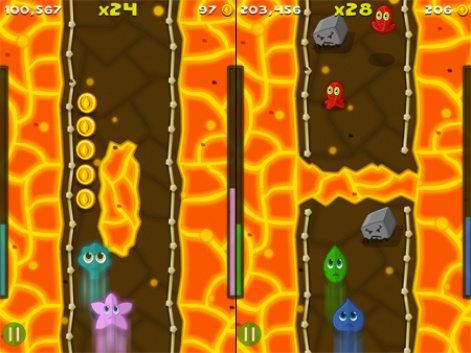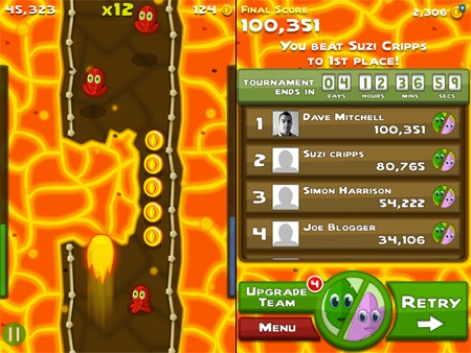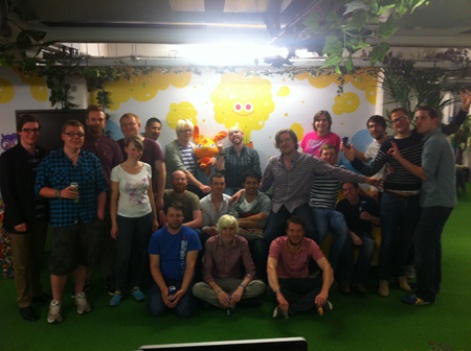As such, whenever PocketGamer.biz happens upon a studio with a story to tell, we're eager to push a few question in their direction.
Onimobi founder Dave Mitchell, of course, is no newcomer. Nor is he in any way green, running both his own development studio and a digital production agency Two Tails itself dealing with on apps for the likes of The National Lottery, De'Longhi and Regaine, amongst others.
What he is, however, is brimming with insight and opinions, having had a hand in the recent Best of British 48 hour game hack with onimobi's first iOS splash Leaf Rider hurtling towards release.
We caught up with Mitchell to talk everything mobile, including his take on the impact on indies of the growing number of console developers moving in on the smartphone scene.
Pocket Gamer: How did onimobi get started?
Dave Mitchell: Wow, it's a long time ago now but I actually started onimobi back in Oct 2009.
The aim to build up a small games studio, create some great games and make a modest sum to keep paying the bills.
But I started with no savings, literally nothing to fall back on, so initially I had to work very hard on client projects which were typically iPhone apps - something I had a lot of experience in previously.
I might add that I had just bought a house with my girlfriend, so I had a mortgage to pay and I quit my job. Looking back I can see I was very sensible in my early days.
In November 2010, Simon [Harrison] joined onimobi, and since then we've been working on games in our spare time but it's been slow going.
Working on the games in between client projects is hard because you can easily lose your rhythm and the paying projects always take priority. At the start of this year, I made the decision to give our games a much higher priority, so we've now been sacrificing some focus on client work to put time into the games side.
It's risky - if we don't make any money from Leaf Rider we might be eating beans out of a cardboard box for a few months!
Leaf Rider is currently gearing up for release. What made you go with the endless runner route?
Leaf Rider started out as a racing game, believe it or not. We've been working on the game on and off for one and a half years, and it's constantly evolved and changed as we've tried out different ideas.
For a long time Leaf Rider had a serious identity crisis, because we honestly struggled to build a fun prototype that we enjoyed playing. I think a lot of this was caused by the on-off nature of our work.

Essentially we've made about four to five different games under the name but canned them.
Me and Simon eventually had a bit of a crisis meeting, and we basically discussed why we had so much trouble making this game. We realised that we were being far too ambitious - building too many levels and other content - and we were worrying too much about stuff other than the gameplay and what made it fun.
This seems obvious now but at the time working on-off it was easy for us to lose sight and focus. So this year we started afresh and we focused on building something we had fun playing.
At the time we'd both been playing a lot of endless runner games. Canabalt, Temple Run, Jet Pack Joyride, Tiny Wings, Off the Leash - these are all games we have had huge amounts of fun playing and have drawn inspiration from.
But we knew from the start that we wanted to make something unique in it's own right and not just another clone of Temple Run.
So we've worked hard on that and I'm really happy with the directions we're taking the game and in particular the dual character game play which we're set to announce very soon.
A lot of endless runners seem to be heading down the 3D path. Is there a risk their 2D alternatives will start to look dated?
I think a lot of endless runners are going down the 3D path frankly because they are trying to emulate Temple Run. I love 2D games and I don't see them getting outdated.
People debated this when 3D games first started appearing on mobile but in the end what matters is whether the game is fun or not. I think you can do a lot in 2D that you can't do in 3D - there's always a place for both.
What kind of problems have you encountered, if any, during the game's development?
As I mentioned above, development of Leaf Rider has been very on and off and this has really hampered us.
Several times we've gone two months through a busy period working on client projects without touching Leaf Rider at all. That hurts because creativity isn't something you can just switch on and off.
It helps to be living and breathing it - that's when the best ideas come out.

I hope that Leaf Rider can be successful enough that it will allow us to focus only on our games in the future.
You're involved in the Best of British movement. How is life for a mobile indie in the UK at the moment, in general?
Calling it a movement, I feel like we should be walking the streets with banners saying 'More rights for indies!' or something.
Honestly, being a mobile indie is fantastic. The indie community is very warming and there is a great sense of friendship among us. I'm relatively new to the scene and I've made friends with a lot of great people.
But being involved with Best of British I hope we can do more than just be friends. I think there is a very real opportunity for us to seriously work together and build awareness of the great UK indie developers that don't get noticed.
Best of British is quite new so I'm not sure in what form that will take yet, but I'm excited for the future. I really hope I can contribute to it's success.
How was the Best of British hack for you?
The Hack was brilliant - it was seriously good fun.
Personally, I didn't spend as much time making games as I'd planned because I kind of volunteered into taking the lead with some of the social media efforts, so I was doing a lot of stuff on the Facebook page, taking videos, pictures, doing some Q&As.

The Best of British game hack team
I love doing marketing and PR so it was all good fun.
There are an increasing number of console or PC developers starting up new mobile studios. Do you worry they might crowd indies out?
Nah, I don't think so.
First of all, a lot of console devs getting into mobile seem to be doing it all wrong anyway.
They're porting existing games with crap control systems, or creating huge ambitious games that don't fit into the quick pick up and play lifestyle that mobile gamers often find themselves.
As indies we have the edge. We can lead the pack because we're small and can adapt quickly to new changes and new technologies. Look at some incredibly successful games on mobile: New Star Soccer, Cut the Rope, Temple Run, Doodle Jump, Tiny Wings - all indies.
But competition and visibility in general is a massive problem, and it's probably going to get worse before it gets better.
Is there a risk that mobile might end up imitating console, with more powerful handsets making one or two man development more and more difficult?
The thing is, the majority of mobile gamers are not looking for Call of Duty or Assassin's Creed on their iPhone.
The iPhone 4 is already more powerful than the PS2, and a lot of the popular games are not pushing the devices to the limit.
But as competition grows games are getting higher and higher quality and that does risk driving out the smaller development teams who can't compete.
Leaf Rider is bound for iOS at launch. Any plans for Android or Windows Phone versions?
Leaf Rider is built on our own 2D engine and we do have plans to get Leaf Rider on Android in the future. It will depend on how successful the game as to what point we do get the game on Android.
Our engine won't run on Windows Phone 7 - no native code - or Windows 8 - no OpenGL - so we're unlikely to support that platform for the time being.
Thanks to Dave for his time.
You can find out more about onimobi on the studio's website.






















